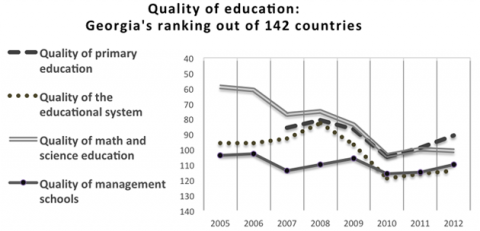Despite spectacular growth performance during the past several years (averaging more than 6% since 2005), Georgia remains a poor country. In 2011, Georgia’s GDP per capita reached USD 3,215, just below the average for small island states in the Pacific and just above Guatemala. Still worse, more than half of Georgia’s population live on incomes that are much lower than this average figure. This is so because the Georgian society is plagued by a very high level in income inequality. For instance, in 2011, Georgia’s Gini coefficient – the most common indicator of inequality – stood at 40.8%. By this measure, Georgia is more unequal than all CIS countries except Russia. Think of this: the richest 20% receive close to 50% of Georgia’s total income, while more than 9% are mired in extreme poverty. To add insult to injury, many of the poor and extremely poor are either long-term unemployed or out of the labor force, not being able to contribute to the country’s economic performance.
There is no need to explain why extreme poverty is a bad thing. It is bad for the poor individuals and their families, it is bad for social cohesion and morale, and it is bad for economic growth. Having the poor productively engaged in economic activity would naturally help increase the size of the pie available for the society as a whole. As importantly, it would also reduce the need for distortionary taxation and redistribution policies. This, in turn, would translate into higher economic growth, higher incomes and greater prosperity for all. Thus, reducing poverty through productive employment should be one of the main policy targets for any developing country, including Georgia. The problem with this policy prescription, of course, is that it’s easier said than done.
A key problem is that poverty tends to reproduce itself through the education channel: poor people cannot afford good (and sometime any) education for their children and as education is one of the main determinants of their offspring’s productivity and, consequently, wages, children of poor families tend to stay poor. Thus, the lack of investment in human capital has the potential to locks poor “dynasties” in a vicious circle. Moreover, if the number of such dynasties reaches a critical threshold the whole country may be trapped in poverty.
The question for Georgia is therefore this: is its education system sufficiently inclusive to break this vicious circle? Judging by some of the available quantitative performance indicators, Georgia is doing very well, certainly if compared to countries at the same level of income per capita. For instance, the World Economic Forum ranks Georgia 3rd in the world according to enrolment in primary education and 11th in secondary education in 2011. Moreover, the introduction of national tests and merit-based government scholarships made the system of higher education accessible for some of the poor. The poor are still discriminated given the availability of expensive private schooling and tutoring for the rich, yet, this is not the major issue. The main weakness of the Georgian education system is quality. For instance, out of 142 countries included in WEF’s Global Competitiveness Index, Georgia is ranked 99th in the quality of primary education and 116th in the quality of the educational system as a whole. As shown in the chart, despite implementing an impressive range of reforms, until 2010, Georgia’s ranking on the quality of education indicators has been either stagnating or getting worse. The poor quality of education and its detachment from labor market needs resulted in very high rates of youth unemployment, up to 35% according to some counts.
IT’S EARLY CHILDHOOD DEVELOPMENT, STUPID!
But a really pressing need for Georgia is to offer pre-school learning opportunities for the Georgian poor, especially in rural areas. While some municipalities, e.g. Tbilisi and Batumi, offer generous discounts to socially vulnerable children in the 3-5 age group, 19 of 65 Georgian municipalities are unable to provide any support for disadvantaged children, resulting in enrolment rates as low as 20%, 17 percentage points lower compared to the average enrolment!
The emphasis on preschool education is not incidental. There is considerable research evidence supporting the view that increasing the availability of early learning opportunities has the largest effect on the future of children. Early learning affects children’s brain development, builds their cognitive and socio-emotional skills and improves performance at all subsequent stages of education. This, in turn, helps increase people’s productivity and earnings as adults, helping to break the vicious circle of poverty, reduce crime and, as a result, increase aggregate welfare.
Much of this evidence is available on the website of an economics Nobel Prize laureate (2000) James Heckman who has made the theme of early childhood development the point of an arduous advocacy campaign. In his words: “The best way to improve the workforce in the 21st century is to invest in early childhood education, to ensure that even the most disadvantaged children have the opportunity to succeed alongside their more advantaged peers".
Is there anybody listening in Georgia?

















Comments
1. The WEF ranking is as useless as a ranking can be.
2. Is there any empirical evidence on the efficiency of preschool education in poor countries such as Georgia. The research I am aware of looks at preschool education in rich countries, and this evidence might not be applicable in Georgia.
Michael, the WEF ranking of education peformance is as useless as a ranking that is based on subjective feelings of a small number of indiduals that do not know what they are talking about (in this case business executives judging education quality). It does reflect the difficulties of business executives to find qualified staff. These difficulties are probably greater in innovative businesses that are trying to break new ground. Anyway..
 , but it helps illustrate the general point...
, but it helps illustrate the general point...
As for the second point, there have been a lot of attempts to empirically measure the impact of interventions at an early stage. Here is quote from a recent study that summarizes the literature on the topic (Jan van Ravens, Scenarios for Early Childhood Development in Armenia, UNICEF Armenia, 2009):
"...the rate of return to investments in early childhood development (ECD) may range from 1.8 to as high as 17.0 (Engle et al, 2007:231). Since such rates of return are often quoted in advocacy statements on ECD, a word of caution is perhaps needed. Rates of returns on ECD are usually calculated by comparing the life course of individuals who have attended a programme while young, with a control group of individuals who did not. A small number of frequently quoted studies in the United States revealed rates of return in the order of 4 to 7, but much of the gains are caused by the fact that individuals who attended the programme have a lesser tendency to criminal behaviour, causing less costs in terms of law cases and detention. Other gains consist of lower spending on healthcare, unemployment allowances, et cetera. In many developing countries, these public services are much less sophisticated and hence less costly, if available at all. This is probably one of the reasons why lower rates of return are generally reported in developing countries: one cannot save much if one does not spend much to begin with. Thus, programmes in Bolivia, Colombia and Egypt saw more modest rates of return between 2.4 and 3.1. However, targeting also makes a difference. The more a programme focuses on disadvantaged groups with a high risk of unemployment, poverty, disease and criminal behaviour, the
bigger the gains, with an Egyptian programme reaching a rate of return of 5.8, and an American one of 17.1."
See also Engle, P., Black, M., Behrman, J., Cabral de Mello, M., Gertler, P., Kapiriri, L., Martorell, R., and Young, M. 2007. Strategies to avoid the loss of developmental potential in more than 200 million children in the developing world. In: The Lancet, 369 (9557, 20 January, pp. 229-242)
In addition to empirical evidence, intervening at an early stage makes perfect theoretical sense:
a) it is less costly (compare the cost of training an economics professor and that of a kindergarten teacher).
b) if properly targeted at the most vulnerable, it has the potential to dramatically change people's lives (compare the marginal benefit of not becoming a drug addict to that of studying a few economics models).
This is of course a somewhat extreme example
Oh, that sounds good. And a much better investment than handouts at a later stage in life. But the big question is probably how this will look like if it is scaled on a national scale. Or is there already research on this?
It is a very informative article, and it is important that somebody raised this issue! In the last 10 years, the rulers of Georgia were guided by a libertarian agenda and neglected to care for the poor, disadvantaged, and for redistribution in general. Yet I do not share your optimism about education for overcoming poverty. I do not know any country which solved the inequality problem without a massive welfare state. Education is just not enough.
Likewise, I am less enthusiastic preschool education -- I cannot believe that kindergartens can substantially compensate for messed up families.
Great article! Without any doubt early education has better effect on a formulation of personality. Not only economic issues, but for example social norms as well can be better enforced through pre-school education.